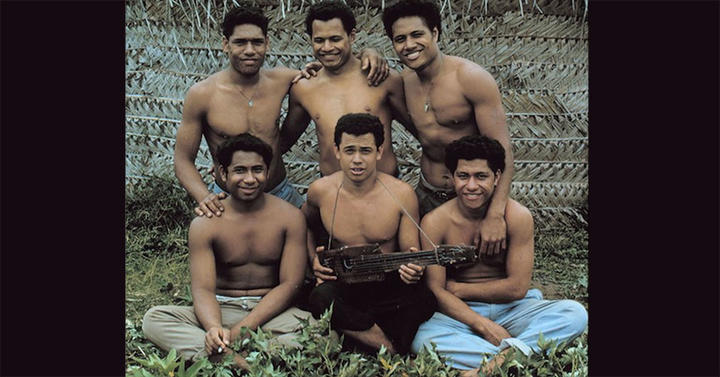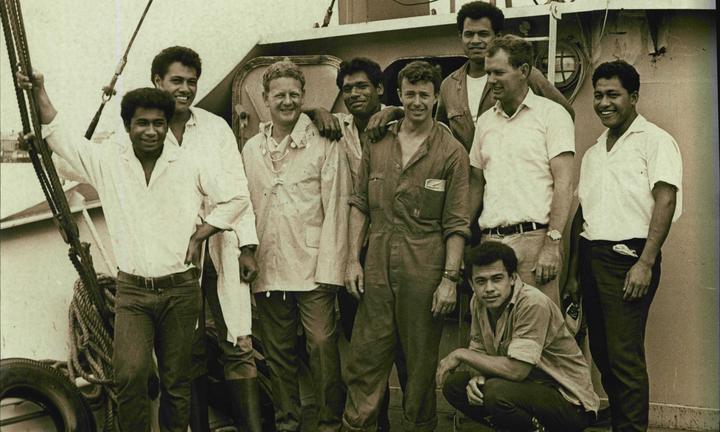The 50-year-old survival story of six young boys who spent at least
15 months on a remote Pacific island after a shipwreck has enchanted
millions of readers across the world this week.
But its retelling, by the Dutch historian and author Rutger Bregman,
has upset some members of the Pacific island community, who argue the
story of the six young Tongan boys, has been instead told through a
"colonial lens" and missed the Pacific point of view.
 From left: Luke Veikoso, Fatai Latu, Sione Fataua and in the front row, from left, Tevita Siola'a, Kolo Fekitoa, Mano Totau.
Photo: Rutger Bregman/Twitter
From left: Luke Veikoso, Fatai Latu, Sione Fataua and in the front row, from left, Tevita Siola'a, Kolo Fekitoa, Mano Totau.
Photo: Rutger Bregman/Twitter
The debate was ignited after
The Guardian published an adapted excerpt of Bregman's new book,
Humankind: A Hopeful History, in which he set out to prove that humans are not "governed primarily by self-interest" but instead "hardwired for kindness".
While researching the book, Bregman came across the story of six
teenage friends: Sione, Stephen, Kolo, David, Luke and Mano, who set off
on an adventure from their Tongan boarding school in 1965, stealing a
fishing boat but ending up marooned on the remote and uninhabited Ata
Island, where they survived for 15 months before being rescued by an
Australian adventurer.
The Guardian excerpt that has now been read more than 7 million times had the headline: "The Real
Lord of the Flies:
What happened when six boys were shipwrecked for 15 months", and it's
that comparison to the historic novel that ignited discussion by
Pasifika people, like Torres Strait Islander and Tongan storyteller
Meleika Gesa-Fatafehi.
"The story is based on Tongans. I'm Tongan and I do not relate to
that story because it was told through a colonial lens," she told the
ABC's
Pacific Beat programme.
"It was bizarre to see a story I've been told, told differently and
told in a way that didn't even prioritise the story of the men."
The excerpt published by
The Guardian was largely told from
the point of view of Peter Warner, the Australian who found the boys,
who Bregman tracked down in Queensland, now aged 89.
Bregman has defended his account and says he also interviewed two of the boys, now elderly men, for the book.
 The survivors, and rescuers, pictured together.
Photo: Fairfax Media Archives/via Getty Images
The survivors, and rescuers, pictured together.
Photo: Fairfax Media Archives/via Getty Images
One of those men is 73-year old Sione Filipe Totau, who now lives in Deception Bay, Queensland.
He told the ABC he does hope to one day tell the story himself and hopes his grandchildren can help him write it.
"I'd like to write a story by myself from how I feel and how I learned from it and all my experiences," he said.
"I told them 'you better write that story while I'm still alive',
because it could make [them] money and everything in the future."
Totau says he and his five friends decided to run away from school because they were "bored".
But they drifted at sea for eight days before finally spotting land
and once on the island, he says they prayed "morning and evening to be
rescued".
"[I was] scared, and hungry and freezing, most of the days were rainy and stormy weather," Totau said.
The story of Totau and his friends has been described by Bregman as "the real-life
Lord of the Flies",
that is "a tale of friendship and loyalty", in contrast to William
Golding's famous 1954 novel where a group of British boys, also marooned
on a Pacific island after a plane crash, turned to anarchy.
Totau told the
ABC he and his friends needed to rely on each other to survive.
"A group of people … don't know where they are and don't have enough
food and water … maybe they don't agree on the same thing, but they have
to try to get together and work together and make everything work so
they can survive," he said.
Gesa-Fatafeh believes that's largely due to their Tongan culture.
"When we find other Tongans we stick together; that is very much in
our value system and it's very different to how those fictional boys
would have been raised," she said.
"We were raised to build community, and it's very hard to exist outside of community," she said.
Their Australian rescuer Peter Warner told the
ABC he believed there are valuable lessons from the boys' experience.
"It brings out determination, justice, love, compassion. All those
things tied together, unites these kids and all of us," he said.
Who owns Indigenous stories?
The story has attracted worldwide attention and Bregman wrote on
Twitter he's been bombarded with emails from producers and directors
inquiring about the film rights of the story.
But it has triggered a broader discussion about who owns, and who should tell, indigenous stories.
Bregman revealed that the boys' rescuer had owned and sold the rights
of the boys' rescue to Channel 7. He wrote that Warner had negotiated
that in order to release the boys from prison, because they'd been
charged for stealing the boat that had capsized when they became
marooned.
While Totau said he had no issue with Warner owning the rights, he
did want to discuss with the surviving members of the six friends how
best they can navigate this new-found attention.
"Some people are blaming him [Warner] because he is making money off of us," he said.
"To those people I say shut up and forget about it.
"He is the one who rescued us. If he [didn't] do that, there is no way for us to come out from the island."
But Gesa-Fatafehi disagreed.
"For me it's so hard to process because 'whiteness' believes it can own anything and everything," she said.
"They essentially don't own the rights to their own life story and that's very upsetting."
The New Zealand Oscar-winning director Taika Waititi has weighed in
on the conversation, writing on Twitter that in his opinion, "you should
prioritise Polynesian (Tongan if possible!) filmmakers as to avoid
cultural appropriation, misrepresentation, and to keep the Pasifika
voice authentic".
Gesa-Fatafehi agreed that if the story was made into a film, she would like to see Tongans behind, and in front of, the camera.
"I think it should be a Tongan team behind it all - a Tongan
director, a Tongan scriptwriter, a Tongan cast and it has to be told in
Tongan," Gesa-Fatefehi said.
"If this movie was to come to life for the six men, then their story
should be told how they want it; it should benefit them and their
families, because it is something they experienced. No-one else."
-ABC


Comments
Post a Comment